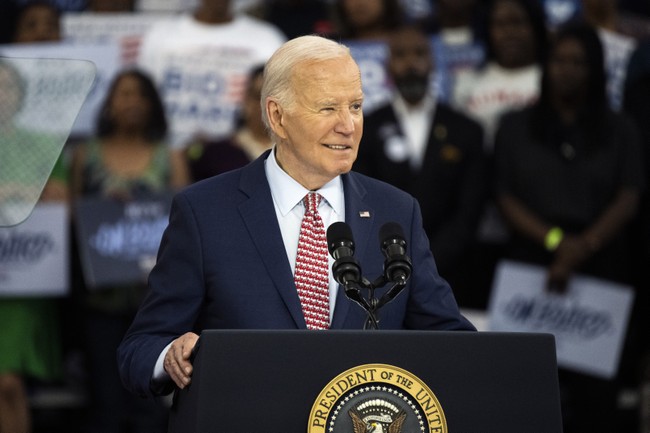
Do any foreign leaders pay attention to President Biden? Sometimes you have to wonder.
Israel is continuing counter-terrorism operations in the city of Rafah in the Gaza Strip, pushing further into the former Hamas stronghold and uncovering more tunnels, weapons caches, and, tragically, the remains of hostages kidnapped on October 7.
For weeks the White House had discouraged Israel from moving into Rafah. Campus protesters were chanting about genocide, and the international diplomatic community was aligning against Israel. The prospect of civilian casualties seemed too great, and the Biden administration did not want to bear the blame for continued suffering and bloodshed. The president drew a red line around Rafah. For the Israelis, it was supposed to be a no-go zone.
The U.S. tried to forestall the operation by brokering a ceasefire, pausing shipments of munitions to Israel, and offering to trade information on the whereabouts of Hamas terror leader Yahya Sinwar in exchange for sparing Rafah. But Israel moved across the border anyway, first securing the Rafah crossing into Egypt, then carefully pushing into Hamas-controlled neighborhoods.
And the Rafah operation turned out to be nothing like what the White House had feared.
As with other operations in this conflict, IDF movements were preceded by warnings to Rafah’s nearly one million civilians to move to safe areas. They were directed to an expanded humanitarian zone in Al-Mawasi. Israel gave specific instructions on where to go and how to get there. Since many people were already living in tents, it was a relatively easy matter to make the move, clearing the way for military operations against the terrorists who remained.
U.S. sources assessed that this movement would take months if it could even be done at all. In fact, it was accomplished in days and weeks.
And once the IDF was on the ground in Rafah, the necessity for the operation became clear. The Israelis have eliminated terrorists, found remains of murdered hostages, and uncovered nearly 700 terror tunnel shafts. Around 50 tunnels led over the border into Egypt, some of which were capable of handling massive vehicles, the smugglers’ highway to Hamas that could resupply the militant group.
So it has been a very effective operation so far, and the hyperbole of the protesters and the fears of the policymakers did not come to pass. Ironically, the White House is now claiming credit, saying that Israel had listened to American concerns and changed how they had planned to conduct the operation in Rafah. But as one senior Israeli official said, “This administration never supports anything we do until we do it.”
Israel going into Rafah despite White House warnings fits a pattern of foreign leaders not taking President Biden seriously.
For example, in 2021, the White House warned Ethiopia to roll back its counterinsurgency against Tigrayan rebels or face consequences. Ethiopia went ahead anyway, mostly pacifying the region with assistance from the United Arab Emirates. The U.S. imposed some mild sanctions but began lifting them two years later.
In February 2022, President Biden had a serious, hour-long conversation with Vladimir Putin, threatening a decisive response that would “impose swift and severe costs on Russia” should they invade Ukraine. Putin did it anyway. Then the White House urged Ukrainian President Volodymyr Zelenskyy to flee his capital in the face of the Russian advance. “The fight is here,” Zelenskyy memorably responded. “I need ammunition, not a ride.” Ignoring American advice gave Zelenskyy a Churchillian moment of defiance that rallied his people to push back the invader. Since then, U.S. sanctions against Russia have been ineffective and U.S. aid to Ukraine inadequate.
In January, the White House threatened military action against Houthi rebels in Yemen who were attacking international shipping in the Indian Ocean and Red Sea. The Houthis ignored the warning. Then the United States and Coalition forces began limited strikes against the Houthis, but terror attacks continued and even intensified. The White House even promised immediately to reconsider the Houthis’ status as a Specially Designated Global Terrorist group if they would please just stop. But the Houthis have ignored the carrots as well as the sticks.
In April when Iran threatened to retaliate directly against Israel for an attack in Syria that killed Iranian generals, President Biden said his message to Iran was “don’t.” Iran went ahead anyway, and the attack was blunted by an impressive, coordinated international defensive effort. When Israel then planned to make a counter-strike against Iran, the White House counseled to “take the win” instead, and do nothing. Israel went ahead anyway. Afterward, the White House had no comment except to deny involvement.
Israel’s move into Rafah fits this pattern: a country signals its intentions, the White House issues a warning. The country acts, the White House may or may not respond, rarely decisively, and with limited impact. There may be an example of where President Biden said “don’t” and the other side blinked, but if so, it is not obvious.
This gets back to the basic impulse of the Biden administration to attempt to manage conflict, not to win, not to seek a permanent solution, but just to keep things settled, to degrade capabilities, to prevent escalation, to convince adversaries that their actions are futile, even if they aren’t.
But you can’t have deterrence without creating fear of serious and lasting consequences. You can’t end conflict by telegraphing your fervent desire that warfare stays in a box. You can’t tell an adversary that they face strictly limited military responses without handing them the initiative to decide how intense that conflict will be. And you can’t back an ally by demanding they not pursue victory even if you find the concept distasteful. The conflict management approach simply produces more conflict to manage as we’ve seen in Israel, Ukraine, Iran, Syria, Yemen, and Ethiopia.
The reason why foreign leaders aren’t listening to President Biden is because they know they don’t have to.








